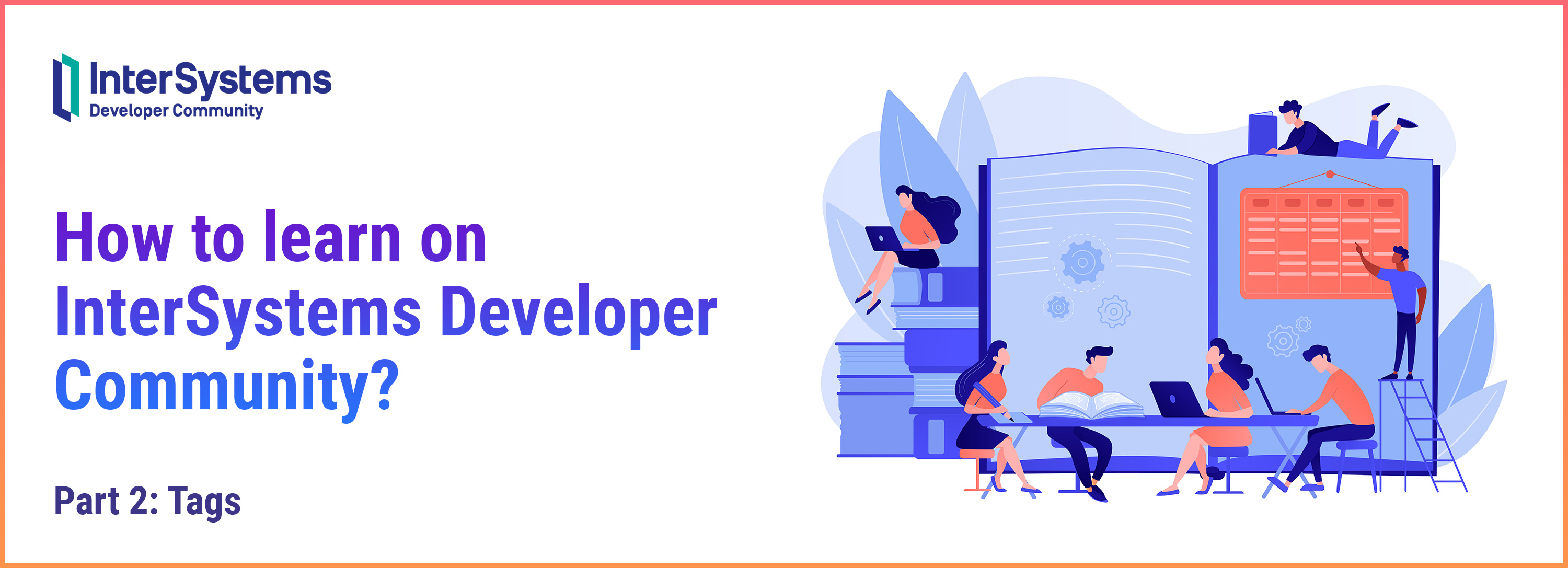How to learn on InterSystems Developer Community? Part 2: Tags
Hi Dev Community members,
In this post, we would like to show you how to use DC tags. Let's make the most of this Developer Community option!

A tag is a word or phrase that describes the topic of the post. Tags are a means of connecting members and experts with posts they will be able to discuss/ give the right answer by sorting posts into specific, well-defined categories.
Tags can also be used to help you identify posts that are interesting or relevant to you.
You can find the full list of tags in the Tags section of the DC top menu:
.png)
Types of Tags and Dev Community Tag Tree
There are two types of Dev Community tags:
- Groups – so-called main tags for broad topics and include all InterSystems technologies.
- Tags – regular tags for more specialized topics.
Each post must have at least one of these groups. Do you know all the groups?
- A tag group for each InterSystems technology (9):
.png)
- A tag group for Visual Studio Code, the popular cross-platform from Microsoft:
.png)
- A tag group for official announcements about the DC or InterSystems:
.png)
.png)
- A tag group for advisories and alerts from the Worldwide Response Center (WRC):
.png)
- A tag group for Open Exchange (InterSystems gallery of software solutions and frameworks built with/for InterSystems), another one for Global Masters (InterSystems Gamification Platform), and another one for the Partner Directory (InterSystems platform for customers and partners):
.png)
.png)
.png)
- A tag group for Global Summit, the InterSystems annual meeting:
.png)
- Tag groups for Online Learning and Documentation:
.png)
.png)
- A tag group for comments, opinions, suggestions... about the DC:
.png)
- A tag group for job opportunity announcements related to InterSystems technology:
.png)
- And a tag group alternative to the rest, for those posts that can't be tagged with any of the previous tags:
.png)
In addition to groups, DC members use Tags to specify even more the content of the posts.
In the DC Tag Tree, you can also find some subtags, categorizing the content of the tags.
As an example, the "Languages" tag has these subtags: "C++", "Python", "JavaScript", "MultiValue Basic", "ObjectScript", "Java" and ".NET".
.png)
It is not mandatory to add Tags to posts, but you must select at least one Group:
.png)
Sorting Tags
You can sort tags in three different ways using the DC Tag Tree:
.png)
1. By popular:
Groups & Tags are sorted by the number of times they have been used in posts. This number appears next to each tag (in parentheses).
For example, the Open Exchange tag has been used in 368 posts:
.png)
2. By name:
Groups & Tags are sorted alphabetically.
3. By new:
By selecting this sort, the most recently created Groups & Tags will be shown first.
Tag page: follow, sort, filter posts with Tags
Each tag has its own URL/webpage, where you can see all the posts that have used that tag.
For example, the "XML" tag has this webpage: community.intersystems.com/tags/xml, showing all the posts using this tag:
.png)
All posts can be filtered by different criteria on the Tag page: by update, by date, by liker, by views, or by replies.
They can also be sorted by post type: announcements, articles, questions, discussions, videos, or jobs. You need to go to the menu in the upper left corner and select the post type you are looking for.
Follow the tags you are interested in!
If you are interested in a subject, you can look for its tag in the DC tag tree, select it and click on the "Follow" button next to it. When you follow any tag, you will receive emails with all posts using that tag.
Tags we suggested to start from: Best practices | Tips and tricks | Beginner | Tutorial.
So...
Take a look at the DC Tag Tree right now – interesting topics (tags) and a ton of useful content are waiting for you:
- read all published posts on the topic of your interest;
- follow the tags so you don't miss any future posts on your favorite topics.
If you have any questions about the tags or you miss anyone, please leave your comments/suggestions below!
Comments
Very interesting, thank you!